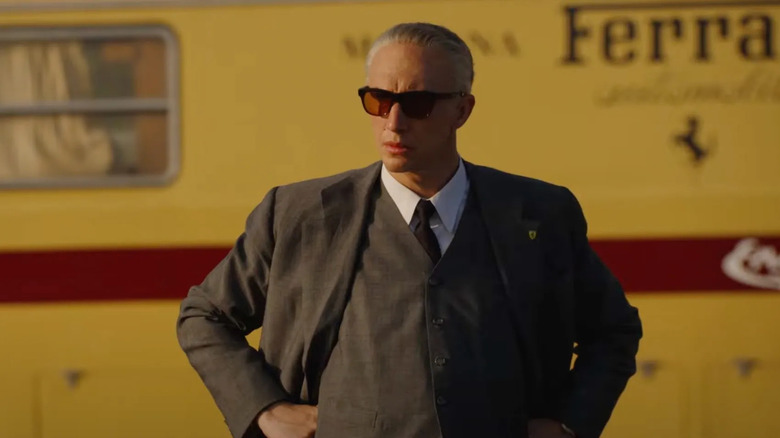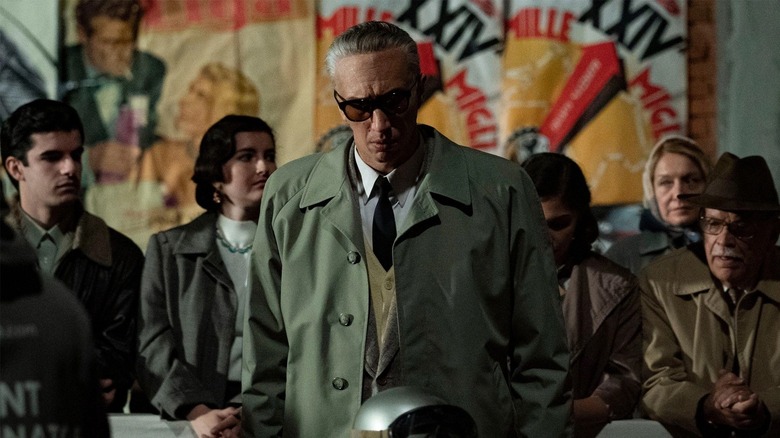Why Ferrari Director Michael Mann Steered Clear Of The Biopic Route
Based on Brock Yates' book "Enzo Ferrari: The Man, the Cars, the Races, the Machine," Michael Mann's new biopic "Ferrari" follows the famous Italian car maker through a significant four-month portion of his life wherein his wife Laura (Penélope Cruz) learns about a secret mistress (Shailene Woodley) and son that he had been hiding for years. His company is also on the brink of bankruptcy and a Ferrari vehicle will have to win the 1957 Mille Miglia, a notable Italian car race, to put the company back on the map. In Mann's usual style, "Ferrari" is terse and distant, and the title character, played by Adam Driver, comes across as aloof and robotic; it's hard to imagine this man being passionate enough to maintain one marriage, let alone an entire secret secondary family.
Mann could have made "Ferrari" into a more traditional biopic that followed its subject from birth to death (Enzo Ferrari died in 1988 at the age of 90), but instead chose to focus only on the summer of 1957 when many dramatic things happened at once. Mann is well-versed in biopics having made three prior to "Ferrari." His 1999 film "The Insider" told the true story of Dr. Jeffrey Wigand, a whistleblower in the tobacco industry and the bombshell he dropped about chemical manipulation of cigarettes to make them more addictive. His 2001 film "Ali" followed Muhammad Ali through his professional boxing career to the start to his famous fight with George Foreman in 1974. And "Public Enemies" was a biography of John Dillinger, the famed organized criminal.
None of these are "whole life" biographies ("Ali" is the closest), and that seems to have been by design. In a recent interview with IndieWire, Mann noted that three-hour chronological biopics don't interest him.
You friendly neighborhood Enzo
Indeed, Mann was quite disparaging of a certain kind of Hollywood biopic that takes a traditional, chronological approach to their subjects. He finds them equal to middle-rent TV documentaries, saying:
"I wouldn't have been interested in some lengthy biopic. [...] Those are documentaries that belong on the History Channel. They never work."
While a lengthy full-life History Channel documentary about the life of Enzo Ferrari would likely have been fascinating in its own way, Mann was clearly more interested in making his movie properly cinematic. He didn't want to merely communicate facts, but tell a dramatic story. For Enzo Ferrari, it certainly helped that the summer of 1957 was so unbearably dramatic for the man. It also helped that so much of the drama took place in the middle of a small town where all the players were literally nearby. Having a single neighborhood to shoot in allowed Mann to focus and explore time, place, and character. The "long arm of history," it seems, could easily be ignored with such an approach. Mann continued:
"[W]ithin this four-month period, all the dynamic forces of Enzo's life are compacted and in collision. Everything in the movie that happened, happened within 500 meters of everything else. [...] The barber's shop is round the corner; the hotel Enzo went to for drinks is opposite; the opera is next door. And he never wanted to go anyplace else. He even stopped going to races and never left the country. So, you have to try and build that sense of intense compression into one neighborhood, making the location that the action is going to take place in as believable and real as possible."
"Ferrari" is to be released on December 25, 2023. Incidentally, "Ali" was also a Christmas Day release.

